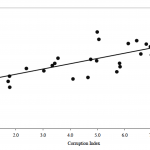
Posted by awynne in School of Business Blog on September 25, 2015
Senior Lecturer in Public Financial Management at the School, Andy Wynne, briefly surveys one of today’s most pressing debates Last December, in Paris, attendees at an OECD donor symposium entitled Anti-Corruption Development Assistance: Good Practices among Providers of Development Cooperation debated the causes and consequences of corruption for two full days. But poverty or inequality […]
Posted in Uncategorized | Tagged Causality, Causation, Correlation, Corruption, Development Economics, Economic Policy, Fraud and Corruption, Gini Index, Inequality, Nigeria, OECD, Poverty, Research Methodology, Scandinavia, Statistics |
Posted by Vanessa Beck in School of Business Blog on June 3, 2015
Lecturer in Employment Studies at the School, Vanessa Beck, considers the economic implications of the legal expectations placed on the contemporary unemployed The social security and support infrastructure provided to unemployed individuals in the UK has weakened substantially. To seek state aid today is, as one commentator recently put it, to travel within a ‘perfect […]
Posted in Uncategorized | Tagged Austerity, Charity, Choice, Competition, Competitiveness, Department for Work and Pensions, Deregulation, Disability, Disabled Workers, DWP, Economic Policy, Employment Relations, ESRC, Liberalism, Paternalism, Policy Making, Private Sector, Privatisation, Public Private Partnerships, Public Sector, Regulation, Social Security, Social Welfare, Third Sector, Unemployment, Voluntary Sector, Welfare, Work Placements, Work Programme
Posted by Stephen Dunne in School of Business Blog on April 15, 2015
Stephen Dunne (henceforth SD): Can I ask you to recount, when you set out on the book, what you were trying to do and in relation to what body of work? WD: The main question I had, following on from my PhD, concerned competition and competitiveness as forms of justification, or as sources of […]
Posted in Uncategorized | Tagged Biopolitics, Bob Jessop, Capitalism, Chicago School, Competition, Competitiveness, Critical Management Studies, Critique, Deirdre McCloskey, Donald Mckenzie, Economic Policy, Economics, Economy & Society, Efficiency, Entrepreneurialism, Entrepreneurs, ephemera: theory and politics in organisation, Eve Chiapello, Finance, Financialization, Friedrich Hayek, Governmentality, John Maynard Keynes, Joseph Schumpeter, Karl Popper, Keynes, Keynesianism, Laurent Thevenot, Leadership, Legitimacy, Legitimation, Liberalism, London Riots, Luc Boltanski, Management, Management Gurus, Managerialism, Marxism, Max Weber, Michael Porter, Michel Callon, Michel Foucault, Milton Friedman, Money, Mont Pelerin Society, Neoliberalism, NHS, Paul Mason, Philip Mirowski, Pierre Bourdieu, Policy Making, Political Economy, Politics, Protestant Ethic and the Spirit of Capitalism, Russell Brand, Scottish Independence, Scottish Referendum, Social Class, Social Studies of Finance (SSF), Sociology, Strategy, Tax, The New Spirit of Capitalism, Thomas Piketty, Violence |
Posted by Chris Grocott in School of Business Blog on February 4, 2015
Lecturer in Management and Economic History at the School, Chris Grocott, outlines a little known escapade of a largely known economist Friedrich Hayek’s ideas on how economies should be organised, or on how state power should be restrained, have affected us all. Daniel Stedman Jones’s Masters of the Universe selected Hayek, alongside Milton Friedman, […]
Posted in Uncategorized | Tagged Economic Policy, Economics, Economy & Society, Fascism, Financialization, Franco, Free Market, Freedom, Friedrich Hayek, Gibraltar, Hayek, Keynes, Labour Market, Liberalism, Liberty, Neoliberalism, Nobel Prize, Political Economy, Politics, Reagan, Spain, Thatcher, The Road to Serfdom, Totalitarianism |


Recent Comments